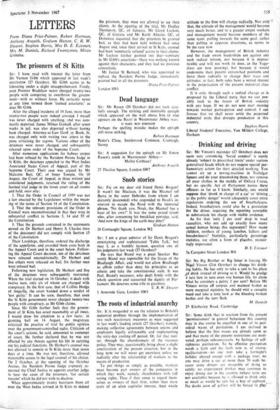The prisoners of St Kitts
LETTERS
From Diana Prior-Palmer, Robert Hartman, Anthony Asquith, Graham Hutton, C. R. W. Shearer, Stephen Harris, Mrs D. E. Estcourt, Mrs M. Daniels, Richard Twentyman, Miron Grindea.
Sir: I have read with interest the letter from Mr Vernon Gibb which appeared in last week's
SPECTATOR (27 October). Mr Gibb Seems to be
labouring under a slight misapprehension. Firstly, even Premier Bradshaw never charged twenty-two people with conspiring to overthrow the govern- ment—with or without force. He certainly never at any time termed them 'trained assailants.' as does Mr Gibb.
After the alleged incidents of 10 June. more than twenty-two people were indeed arrested. I myself was never charged with anything, and was sum- marily deported. James Milnes Gaskell. after seven weeks in jail, was also deported without having been charged. Attorney-at-Law Geoff ey Boon, Jr, was charged only with writing two ktters to the press criticising the regime. Various other of the detainees were never charged, and subsequently released upon order of the Supreme Court.
After numerous applications for habeas corpus had been refused by the Resident Puisne Judge in St Kitts. the detainees appealed to the West Indies Associated States Court of Appeal, part of the Supreme Court. Their case was argued by Mr Malcolm Butt, QC, of Inner Temple. On '10 August. the Court of Appeal, in three written"and considered judgments, reversed the ruling of the learned trial judge in the lower court on all counts and held, inter alto: 1. That the Order in Council of 1959 was not a law enacted by the Legislature within the mean- ing of the terms of Section 14 of the Constitution.
2. That the relevant provisions of the Order in Council were unconstitutional in that they were in substantial conflict to Sections 3, 14 and 5'S of the Constitution.
3. That the grounds contained in the statements served on Dr Herbert and Henry S. Charles (two of the detainees) did not comply with Section 15 of the Constitution.
Their Lordships, therefore, ordered the discharge of the appellants, and awarded them costs both in the Appeal Court and in the court below. Follow- ing the Appeal Court decision, ten of the detainees were released unconditionally. Dr Herbert and five otheis were released on bail. Six further men were refused bail.
Following new legislation, Dr Herbert and five of the detainees were subsequently rearrested. When the trial started on 16 October, it dealt with twelve men, only six of whom are charged with conspiracy. In the first case, that of Collins Hodge of Anguilla. the court handed down a verdict of 'not guilty.' It can be seen, therefore, that even the St Kitts government never charged twenty-two people with conspiracy, as Mr Gibb claims. 1 Since Mr Gibb further feels that the govern- ment of St Kitts has acted reasonably at all times, I would draw his attention to a few facts: in granting bail on 14 August, the magistrate criticised the practice of trial by public opinion over the government-controlled radio. Criticism of the court's actions, he said, amounted to contempt of court. He further declared that he was not affected by any threats against his life in carrying out his judicial functions. Dr Herbert's counsel was not allowed to remain in St Kitts more than seven days at a time. He was not, therefore, allowed reasonable access to the legal counsel of his choice. On 2 October, at the opening of the October Assizes, the Resident Puisne Judge expressly re- quested the Chief Justice to appoint another judge to hear the cases of the -prisoners, 'for certain reasons' which he did not wish to disclose.
When approximately twenty barristers from all over the West Indies arrived in St Kitts to defend the prisoners, they were not allowed to see their clients. At the opening of the trial, Mr Dudley Thompson, QC, of Jamaica. Mr Lloyd Luckoo, QC, of Guyana and Mr Keith Alleyne. QC, of Dominica requested that the prisoners be granted bail, as they had been held without bail since August and, since their arrival in St Kitts, counsel had been 'summarily refused' access to their clients. Mr Luckoo further pointed out that—contrary to Mr Gibb's assertions—there was nothing known against their characters, and they had no previous convictions.
Mr Justice St Bernard, who was appointed to replace the Resident Puisne Judge, immediately granted bail to all the prisoners.










































 Previous page
Previous page